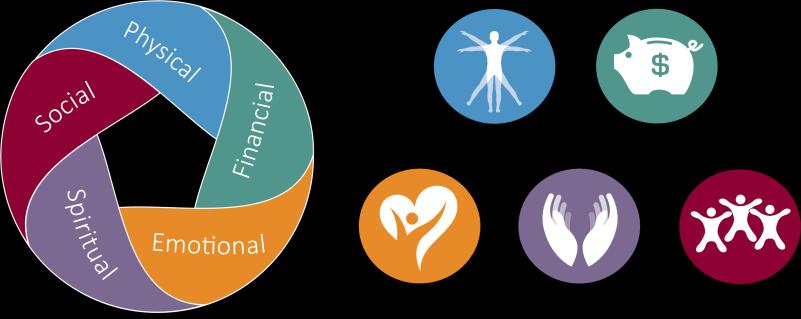






• The well-being of United Methodist clergy affects the entire connection, including the families, congregations and communities they serve
• Wespath supports well-being with a focus on five dimensions of physical, emotional, spiritual, social and financial well-being
The biennial Clergy Well-Being Survey provides meaningful feedback to ensure programs and resources meet the needs of our participants

• 2013-2023 results showed an overall worsening
• Areas where 2025 results remain concerning, but have stabilized (negative trend not continuing)
➢ Asthma and blood pressure (hypertension)
➢ Functional difficulties from depressive symptoms

➢ Social well-being (feeling understood by friends and family))
➢ Occupational stress (loneliness, isolation, too many demands)
➢ Workload
➢ Perceived stress
➢ Financial knowledge and retirement readiness
➢ Sleep and vacation time

Indicates no change from 2023 results


• Areas that have shown improvement, but are still below desired levels

➢ Normal BMI – normal vs. too high
➢ Spiritual Vitality – presence of God in Ministry (sharing sacraments, counseling, pastoral visitations, church events)
➢ Congregational health – force for positive change, vital and alive congregations, clear mission, willing to meet new challenges
➢ Levels of depression are down compared to 2021
➢ Improvement in number of people seeking treatment for depression

Improved from 2023 results
• 2025 areas that are continuing to decline
➢ Cholesterol
➢ Financial stress
➢ Aspects of Spiritual Well-Being

▪ Things unfolding according to God’s intent
▪ If I become ill, things will be ok
▪ Feeling at peace

Declined from 2023 results

since 2013

The percentage of respondents that report excellent to very good health is approximately 10% points below the matched U.S. benchmark

Spiritual Well-Being in ministry has improved
Spiritual Vitality: Feel the presence of God in ministry

When conducting pastoral visitations

When sharing sacraments

When participating in Church-related events

When sharing in crisis intervention or counseling

Improved from 2023 results

Spiritual Well-Being in daily life is generally stable
Spiritual Vitality: Feel the presence of God in daily life

76% Have a vital relationship with God 45% Feel events are unfolding according to God’s intent


69% Feel God’s grace and love as they are, apart from any accomplishments or good works

No change from 2023 results

Declined from 2023 results

Percentage of clergy with a high BMI is improving, but still higher than the matched benchmark

19% Have a Body Mass Index (BMI) in the normal range 80% Have a BMI in the overweight or obese range*

Obesity across UMC clergy continues to be 10+ percentage points higher than the U.S. and matched benchmarks
National Health Information Survey (NHIS)

Improved from 2023 results
* The 2023 summary only reported percentage of clergy classified as obese

Physical Dimension
Diabetes and hypertension are stable, cholesterol worse than previous years


With diabetes or pre-diabetes

With hypertension or pre-hypertension

Declined from 2023 results

No change from 2023 results

Stress and depressive symptoms are stable, but continue to be a serious problem

10% Report suffering from depression*

19% Report being treated for depression

35% Report functional difficulties from depressive symptoms*
* Higher than U.S. matched benchmark from National Health and Nutrition Examination Survey (NHANES)

No change from 2023 results

Improved from 2023 results

Most measures of perceived stress remain at concerning levels, similar to 2023
48%

Feel things were not going their way

37% Don’t feel “on top of things”
40%


Feel nervous and stressed
Not able to control irritations in their life No change from 2023 results 28%


Declined from 2023 results

Social connection is steady, but too many clergy still feel disconnected from family and friends

28% Report not feeling understood by family and friends

No change from 2023 results

Stable but still an area of concern
33%

Feel lonely and isolated at work
27%

32%

Feel too many demands from the congregation
Fewer full-time clergy are working 51+ hours per week over the last decade per week

No change from 2023 results

Financial well-being declined to pre-pandemic levels
42%

Think their financial situation is at least moderately stressful
74%

Think their financial situation is at least slightly stressful
48%

Not confident they are on track for a comfortable retirement


No change from 2023 results Declined from 2023 results

higher rates of disease, high blood pressure, high and diabetes have higher rates of autoimmune experience more and functional difficulty with depressive symptoms
Older clergy suffer from more physical ailments
Younger clergy struggle more with stress, depression and spiritual well-being
Rural clergy suffer from
more from physical ailments like diabetes and high blood pressure
Urban clergy struggle more with spiritual vitality
White/non-Hispanic clergy have higher rates of depression, score lower on spiritual health and get less exercise
Black clergy have higher rates of hypertension, but report better spiritual health, less stress and more exercise
Hispanic clergy report more financial stress and get less exercise and sleep
Asian clergy have lower rates of obesity, diabetes, asthma and autoimmune conditions, and report less stress and better spiritual well-being


Part-time pastors report higher rates of some physical conditions, but better spiritual health and less stress
Full-time clergy experience lower spiritual health and more stress, including financial stress
Church planters report healthier ministry settings and get more physical activity
Clergy in pastoral appointments report lower overall health
Those in extension roles report more stress
Clergy at smaller churches have more physical health concerns and take fewer vacation days
Those at larger churches experience more occupational stress and lower spiritual well-being
Clergy with multiple charges are less healthy overall and experience less social connection
Clergy who frequently change appointments experience lower overall health, more obesity, higher cholesterol, more depression, more stress, and lower spiritual health
Those or cross appointments report less depression, spiritual healthier

In line with our mission of “Caring For Those Who Serve,” Wespath takes the results of this survey seriously. We will continue taking action to stem downward trends and help the Church support clergy’s overall well-being. Our efforts are concentrated in several areas:
1
2
Continue to cultivate our well-being programs and resources to ensure they are meeting the areas of need for clergy
3
Encourage use of programs that help bolster areas of well-being
4
Foster and encourage conversations about clergy well-being with leaders and members across the UMC connection
Work across the denomination to combine energy, efforts and focus on improving clergy well-being
